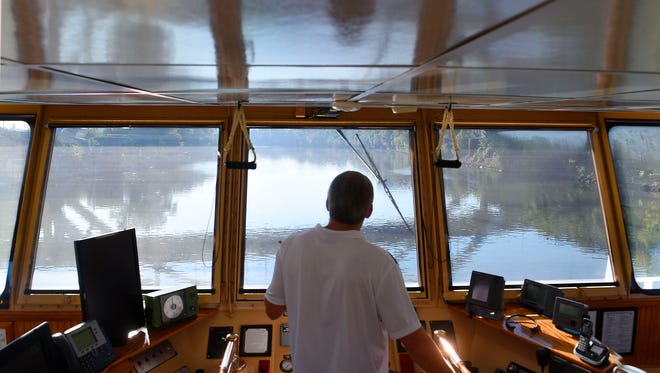Life of a towboat captain: beauty, barges and adept 'parallel parking'
Brad Schmitt
brad@tennessean.com


It’s a giant game of water Tetris.
As the towboat churns up the Cumberland River, it starts passing dozens of bunches of barges tied up along the riverfront. There’s a break in the barges, a space just slightly longer than the towboat.

Capt. Todd Butts has to slide his towboat into that tight gap, but it isn't a big deal for the guy with 16 years of experience steering 4,000-horsepower water crafts.
“Just parallel parking,” he says softly with a wry smile.
The parallel parking job takes about 20 minutes before deck hands start lashing a group of 15 barges — three wide and five deep, all but one empty — to the towboat.
The crew has been charged with dropping off three just over the Kentucky state line before taking the rest upriver to Paducah, Ky.
Butts and his fellow barge captains and crews push 22 million tons of sand, coal, scrap metal and other material each year on the Cumberland River.

River traffic remains vital to the Middle Tennessee economy, offering a cheaper, more efficient and environmentally friendly means of moving cargo than, say, a fleet of trucks.
From an air-conditioned, wood-paneled wheelhouse atop the towboat, Butts, 47, looks out the front window at his crew.
“Where’s that man’s gloves at?” he says easily in a deep voice with a Southern accent. “He needs some gloves on.”
Word spreads on portable radios until that worker is wearing gloves.
Word spreads on portable radios until that worker is wearing gloves.
Butts smiles an easy smile. He loves being outside and enjoys running the towboat and its crew, a role that is so much more than a job.
For six months a year — like most towboat crew members — his job is his life. The men work 30 days on, 30 days off, and most talk about having two families, one on land, the other on water.
The schedule is what attracted Butts to towboats in the first place, 28 years ago, when he’d just turned 20.

“Two weeks before I first got on a towboat, I didn’t know what a towboat was,” Butts said.
He had a friend in his hometown of Cadiz, Ky., about 83 miles northwest of Nashville, who worked on a towboat. Butts loved his buddy’s work cycle. The way he saw it, his friend got six months off each year to hunt and fish and play golf.
Turns out it wasn’t only the schedule Butts liked. He enjoyed being out on the river, no matter what the weather was.
“It grew on me quick,” he said. “I knew pretty quick I’d be doing this the rest of my life.”
So what's life like for him and his crew?

When it comes to steering, technology helps.
There’s a giant GPS screen that shows where the boat will be in 90 seconds.
On a towboat, you have to think that far ahead to turn effectively with 1,000 feet of barges — more than three football fields long — in front of you.
“It’s like driving a car on ice,” Butts said. “You drift.”
If the barges are empty and there is strong wind, well, “it turns it into a whole new ballgame,” he said.
There are some downsides of being on the river, though.
Butts said he asks his wife to be the disciplinarian for the kids.
“I don’t want to come home and be the bad guy. But it don’t always work out that way.”

While working, Butts calls home daily, talking at length with his wife and speaking briefly with the kids.
“It’s like, ‘Hi Dad! I love you. Wish you were home. I’m going to play. Bye.’ ”
It’s really tough for captains to see swimmers and small boats, so binoculars are used often in the wheelhouse.
The scary part is that it takes about a half-mile for towboats pushing barges to stop. The captain hits five short blasts on a horn to warn boaters and swimmers he’s coming.
If a ski boat stalls in front of them, well, “it’s a lot of stress.”
If there's an emergency, crew members sprint the length of the barges to help stalled boaters or swimmers in distress.

When the sun or clouds hit the river a certain way, it’s absolutely breathtaking.
That’s when Butts takes out his cellphone and starts taking pictures.
“My wife, she tells me, ‘You take the most awesome pictures of nature and outdoors, but you can’t take a picture of a person. It’s a train wreck,’ ” Butts said, smiling.
His river pics on Facebook have caught the attention of some hometown friends. A board member at the Janice Mason Art Museum in Cadiz, Ky., has promised Butts his own show soon to display those pictures.
“Pretty neat,” Butts said.

No comments:
Post a Comment